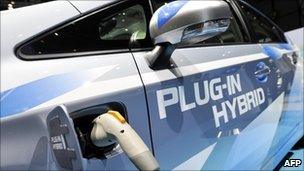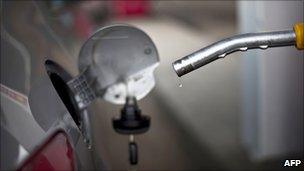Electric cars face hazy future due to nuclear crisis
- Published

Countries have been promoting use of electric and hybrid cars by offering subsidies on their purchase
Nations worldwide, especially developed economies, have been trying to reduce their dependence on energy made by burning oil, gas and coal.
Greener and cleaner has become the catchphrase for governments as they encourage greater use of renewable energy sources such as solar power or wind farms, or nuclear power, none of which emit carbon dioxide the way fossil fuel power stations do.
The motor industry is playing a big role in green technology, with petrol-electric hybrid and electric cars being touted as the future drivers of growth.
But the crisis at the Fukushima Daiichi nuclear plant in Japan has raised some questions about the immediate future of such vehicles.
'Energy policy'
The radiation leak crisis has raised concerns across the world about whether nuclear power is safe, with some countries responding by promising to reconsider their nuclear energy policy.
Analysts say that if as a consequence countries roll back their investment in nuclear energy, it may put the push for electric vehicles on the back burner as well.
"Electric cars are an offshoot of the energy policy of a country," according to Vivek Vaidya of Frost & Sullivan.
The reason behind that is simple. Electric vehicles operate on batteries that need to be charged.
If batteries are charged by electricity produced by nuclear power plants, the objective of reducing carbon dioxide emissions is achieved, Mr Vaidya reasons.
However, if the electricity is produced by burning fossil fuel it defeats the object as it is not only expensive to generate that power, but it also does nothing to reduce emissions.
"If you are producing energy by burning coal, then using it to charge your car it is not beneficial," he says.
So the overall success or failure electric vehicles depends on the source of energy being used to charge them.
Domestic demand
Japanese car makers have not only led the way in research and development of electric and hybrid vehicles, the government there has also been going all out to encourage domestic consumers to drive them.
Japan has been offering subsidies of as much as 770,000 yen ($9,518; £5,839) to drivers of electric cars.
However, the devastation caused by the earthquake and tsunami has seen nuclear reactors in Japan being shut down.
That has resulted in a shortfall in the supply of nuclear energy, which has already resulted in power cuts in the country.
Analysts say this is going to affect growth of the electric vehicle segment of the Japanese motor industry.
"The nuclear crisis will slow down the rate at which the electrification [of motoring] in the country is happening," predicts Mr Vaidya.
The earthquake and tsunami have caused massive damage to Japan's infrastructure.
As the government focuses on putting the infrastructure back on track, it may mean plans to install more charging bays for electric cars may also have take a back seat for now.
"The overall rates of [electric motoring] growth will slow down, as infrastructure development gets delayed," Mr Vaidya forecasts.
Changed focus

Concerns over the shortfall in supply has seen oil prices reach two-and-a-half-year highs
Concerns about the safety of nuclear energy are at a high in the wake of developments at the Fukushima Daiichi nuclear plant.
However, some analysts say that this will not alter governments' policy on cleaner energy, though it might change their focus.
"In the short term there will probably be a swing towards other forms of fuel," says Rajiv Biswas of IHS Global Insight.
"Solar and wind energy will get a bigger and better push," he adds.
Mr Biswas says the technology in these sectors continues to improve making it more cost effective.
Analysts say a renewed push towards these forms of energy generation will be good news for the auto industry.
"Anything which comes from solar, wind or geothermal energies is a boost for the electric cars industry," says Mr Vaidya.
"These are zero-carbon footprint energies, hence they help achieve one of the main objectives of driving an electric car," he explains.
Oil prices
The recent surge in oil prices is also likely add further impetus to the governments' push for alternate sources of energy.
Crude oil prices have been hovering around two-and-a-half-year highs in wake of the unrest in Libya and the Middle East. Analysts say the prices are likely to rise even further.
"The price of oil and coal are likely to rise significantly in the next 10 years," says Mr Biswas.
"There is a huge uncertainty about what is happening now. You can't be sure of supply," he adds.
Mr Biswas also warns that even as supply concerns from the current pool of oil producers continue to grow, the demand for oil will keep on increasing.
"Rapid growth of autos in emerging markets like China and India is fuelling demand. It is not going to stop," he says.
Analysts say that given these factors the push for electric cars may gain even more momentum.
A timely end to the Fukushima Daiichi nuclear crisis may well be the stepping stone for that.